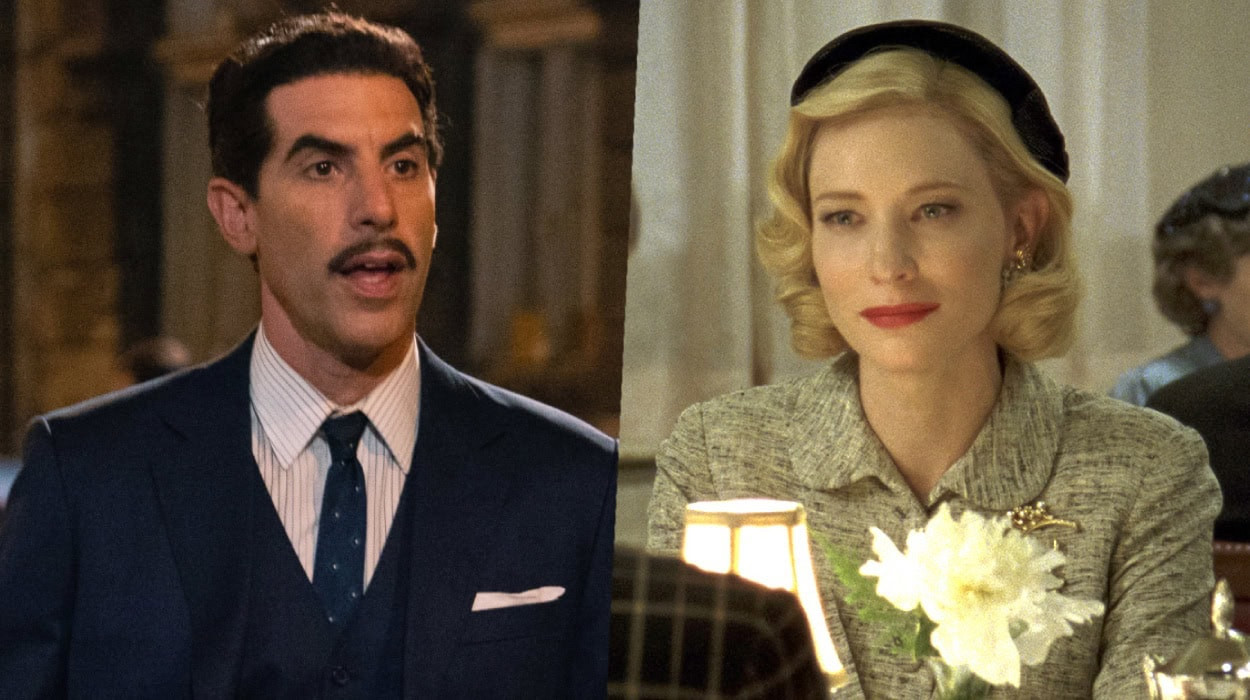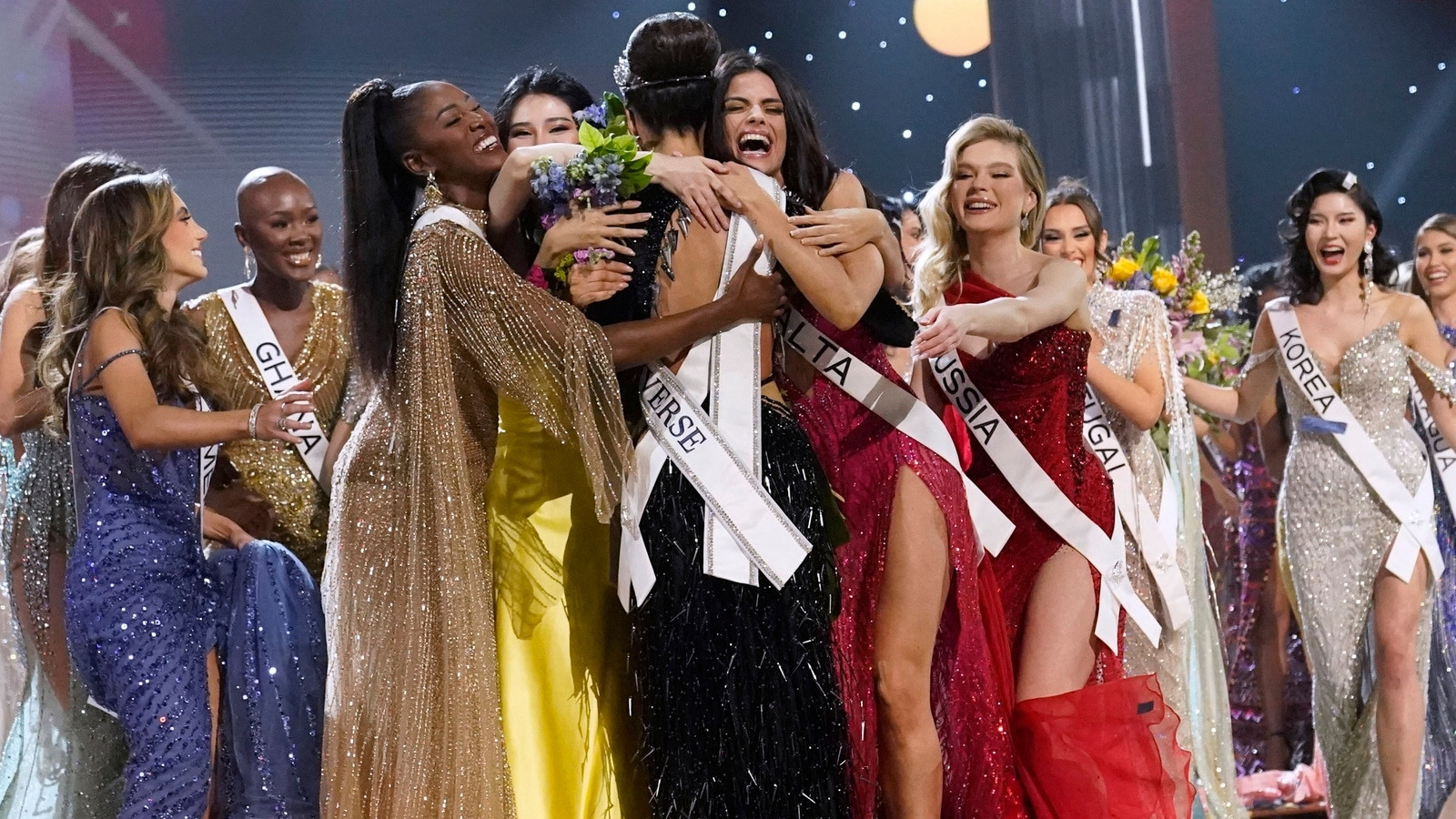Apple TV+'s latest starry drama sees the Oscar-winner play a famous journalist terrorised by a vindictive man via a self-published novel. It's intelligent and beautifully shot.
In Alfonso Cuarón's most dazzling films, including Children of Men, he trusts his audience to follow his lead, however winding the narrative path. That approach shines through in Disclaimer, a twisting series that takes on the eternal yet timelier-than-ever subject of fiction v reality. Cate Blanchett stars in the juicy role of Catherine Ravenscroft, a famous investigative journalist who is anonymously sent a novel in which she is, unmistakably, a scandalous character. Disclaimer doesn't have anything new to say about how our imaginations fill in the blanks of reality, but Cuarón and Blanchett make the series an engrossing, intelligent romp.
Cuarón wrote and directed all seven episodes, and slows the pace from its source, the 2015 novel by Renée Knight. The story flashes back and forth in time, gradually filling in details, at first with some deliberate confusion. We see a young couple having sex on a train travelling in Europe, but don't yet know who they are. Soon we meet a retired London teacher with the suitably fussy name Stephen Brigstocke, played by Kevin Kline with devilish glee. Stephen has just discovered a novel written by his late wife. Recognising Catherine in it, he has the book self-published under a pseudonym and mailed to her, with the disclaimer usually found in fiction altered to read: "Any resemblance to persons living or dead is not a coincidence".
Catherine is not the most challenging role Blanchett has ever played, but she is, as always, enormously convincing, ramping up Catherine's distress with each turn of the screw from Stephen as he threatens to ruin her life. He blames her for a tragedy that touched him, and, out for revenge, follows up by sending her photos even more explosive than the novel. Blanchett navigates the performance beautifully. Catherine becomes increasingly frenzied, yet remains sympathetic in her desperation, no matter how badly she might – or might not – have behaved years before.
Kline plays Stephen with great precision. He is full of grief for his wife, who died nine years ago, and wanders around wearing her worn-out pink cardigan. But he is also mean-spirited about his former students. As his scheme goes on we see him masquerade as a pathetic old man when it suits him, only to turn his back and show a sly grin that gives the game away. Stephen becomes reprehensible, yet Kline is always intriguing to watch. Kodi Smit-McPhee is touching as Catherine's aimless, unhappy son. A miscast Sacha Baron Cohen, in what looks like an unfathomably bad wig, plays her husband, Robert. His stiff performance makes Robert more of a gullible dolt than he's meant to be.
The first section of the series lays out the revenge plot, and Catherine's efforts to find – and then silence – Stephen. Much of the middle section is given to flashbacks, and many of those take place in Italy. The great cinematographers Emmanuel Lubezki and Bruno Delbonnel create a gauzy, enticing look there, but they make even the rainiest London days look glowing.
Lesley Manville is heartbreaking as Stephen's wife, Nancy, who spirals downwards into a lasting depression after the death of their teenage son, Jonathan (Louis Partridge). Other flashbacks play out scenes from Nancy's novel, with Leila George as a younger Catherine. That middle section is also the sexy part of the show, a reminder that Cuarón has been a master of simmering eroticism going back to Y Tu Mamá También (2001). Here he makes words and glances steamy. But Nancy could not possibly have witnessed everything she put in the novel, and Cuarón's story becomes even more teasing.
In voiceover, we often hear Stephen explain his plans, a first-person narration that works because he seems to be addressing us, making us complicit in his scheme. But an alternating narration from Catherine's point of view in which a disembodied voice (Indira Varma) addresses her as "you", is just annoying. When a distraught Catherine looks in the mirror after reading the novel we hear, "You have seen this face before. You hoped never to see it again. Your mask has fallen." Blanchett lets us see what Catherine is feeling. There's no need to explain her thoughts.
Narrators are unreliable and memories are subjective, in fiction and reality. Why it takes some characters in Disclaimer so long to figure that out is a bit of a head-scratcher. That hardly matters, though, as Cuarón leads us through this constantly intriguing maze of possibilities.
★★★★☆
Disclaimer is available now on Apple TV+ internationally
No one films the ocean as a proxy for emotional extremes like Alfonso Cuarón. In films like “Children of Men,” “Gravity” and “Roma,” the Mexican director — often in conjunction with Oscar-winning cinematographer Emmanuel Lubezki — makes roiling waves a metaphor for everything from rebirth to safety to cathartic rebirth. In this respect, the new Apple TV+ series “Disclaimer,” which Cuarón wrote and directed in its entirety, is a perfect fit for the “Y tu mamá también” auteur. “Disclaimer” centers on competing accounts of a young man’s fatal drowning on an Italian beach, and you can bet your bottom lira there are numerous and lengthy scenes built around the rhythmic crash of water.
But Cuarón is a much less intuitive match for other aspects of “Disclaimer,” which he adapted from Renée Knight’s 2015 novel of the same name. “Disclaimer” is, at its core, a talky, interpersonal drama about grief, self-deception and storytelling, a genre that does not play to the strengths of a filmmaker who tends to package intimacy in epic spectacle. (Even “Roma,” a memoir of his own upbringing in Mexico City, incorporated elements like a massive student uprising.) Nor does “Disclaimer” itself take well to its new medium. The series is neither the first book-to-TV project to cling to devices, like excessive narration, best left on the page, nor is it the only show driven by marquee film talent, like stars Cate Blanchett and Kevin Kline, to struggle with episodic pace and structure. “Disclaimer” starts as a strange, confounding watch, and ends with a twist sapped of impact by the seven hours that precede it.
After her triumphant turn as Phyllis Schlafly in “Mrs. America,” Blanchett returns to television for “Disclaimer” as Catherine Ravenscroft, an acclaimed documentarian suddenly confronted by an incident from her past. Catherine’s actual work is ignored by the show in favor of its symbolic import: She’s dedicated her life to unveiling the truth, but when a self-published novel called “The Perfect Stranger” lands on her doorstep, the book’s contents imply her affluent existence may be built on a lie. Its titular disclaimer declares that any resemblance to persons living or dead is not a coincidence.
“The Perfect Stranger’s” publication, we learn, is the work of Stephen Brigstocke (Kline, shockingly convincing as a Brit), who throws himself into an elaborate quest for revenge after losing his job as a teacher and his wife Nancy (Lesley Manville) to cancer. It was Stephen and Nancy’s son Jonathan (Louis Partridge) who died on his gap year in Italy all those years ago, and “Disclaimer” alternates between Stephen’s pursuit of Catherine and flashbacks that seem to explain why he blames her for Jonathan’s fate.
Lubezki, an executive producer who shares DP duties with Bruno Delbonnel, saturates these scenes with a golden-hour glow that illustrates Jonathan’s infatuation with a younger Catherine (Leila George), on a vacation with her five-year-old son. In the present, Stephen sends compromising photographs of Catherine to her posh husband Rob (Sacha Baron Cohen, enjoyably pathetic as a cuckold), who enters a downward spiral of sexual insecurity, and catfishes her now-adult son Nicholas (Kodi Smit-McPhee), a slacker who lives in a dingy shared flat and works at an appliance store. Smit-McPhee, so captivating in “The Power of the Dog,” is wasted as a burnout whose degeneracy is lazily signaled by his love of hip-hop.
Whether or not Stephen’s master plan is ultimately righteous, there should be a little more nasty fun in watching him immiserate Catherine so completely. Sporting bushy eyebrows and Nancy’s favorite pink cardigan, Kline seems to be giving a more comedic performance than Cuarón settled on in the edit, practically rubbing his hands together as he plays the doddering old man to his clueless marks. Instead, Cuarón roots the show in Catherine’s extended breakdown. The roving camera seems to hunt Blanchett through her character’s London townhouse and hip industrial office space, both impeccably rendered in contrast with Stephen’s dowdy row house by production designer Neil Lamont and set decorator Pancho Chamorro.
Unfortunately, Blanchett is operating in a mode she’s already perfected elsewhere. As another wealthy woman getting her comeuppance, she won an Academy Award for “Blue Jasmine”; as a celebrated figure staring down the barrel of cancellation, she gave the performance of a lifetime in “Tár.” But as Catherine, she’s doubly handicapped. First, Cuarón insists on employing a verbose, second-person narration — “Your misguided belief you had a right to silence has condemned you” — by Indira Varma. (At least Stephen gets to voice his own thoughts, though neither audio track is especially additive.) Second, Catherine’s side of the story is strategically withheld until the last minute, a decision that fails to generate suspense while still taking a toll on the character.
By the time Catherine portentously proclaims, “It is time for my voice to be heard!”, it has long been obvious that the Italy interludes, including some startlingly graphic sex scenes that portray Catherine as a horny MILF and Jonathan her adoring disciple, do not represent the objective truth. But “Disclaimer” delays the reveal until long after any tension has given way to aimless angst. The momentum of both Stephen’s chase and Catherine’s need to defend herself peters out in a way it might not in a compact feature film. If you’re tired of reading that criticism of prestige miniseries, imagine how tired critics like me are of making it!
What “Disclaimer” builds to, and what these flaws fatally undercut, is an unsuccessful attempt at feminist commentary. When “The Perfect Stranger” gains some popular traction, a bookseller describes the Catherine surrogate as “this awful female character.” Like “Fleishman Is In Trouble,” another adaptation that struggled to translate its pointed perspective flip into television, “Disclaimer” can’t find a more artful way to make its metafictional argument about women’s obscured points of view.
There’s a surreal, Kafkaesque cast to how totally Catherine’s world turns on her that “Disclaimer” doesn’t embrace enough to transform into pure allegory. The show simply seems unbelievable, both in terms of its characters’ behavior and, tragically, the real biases it works to highlight. Cuarón crafts some indelible images in the process, but can’t shape “Disclaimer” into a functional vessel for its own story.
The first two episodes of “Disclaimer” are now available to stream on Apple TV+, with remaining episodes airing weekly on Fridays.
A Variety and iHeartRadio Podcast
The Business of Entertainment Between them, Cate Blanchett and Alfonso Cuarón are responsible for two of the finest moments of early 21st-century cinema. Blanchett famously delivered the opening voiceover to Peter Jackson’s Lord of the Rings trilogy – an information-dump of Middle-earth lore that should have landed like a wet weekend at a Tolkien convention but into which she invested a magisterial spookiness (“but they were all of them deceived, for another ring was made”).
Cuarón, for his part, gave us Children of Men, a dystopian portrayal of a world grappling with a refugee crisis, plunging fertility rates and far right politics that, over the years, has been revealed less as science fiction than premonition. It is one of the greatest films of the past quarter century – and a disturbing flash-forward to a future that may yet be steaming down the tracks.
With that record, Disclaimer – a seven-part Apple prestige drama starring Blanchett and written and directed by Cuarón – should be a slam-dunk for the ages. What a disappointment, then, that Blanchett’s intense acting style and Cuarón‘s auteur touch prove wildly unsuited to the demands of the binge-watch era.
Squandering talents assembled behind and in front of the camera, Disclaimer (Apple TV+ from Friday) is pretentious and indulgent – full of hateful, pathetic characters and besotted with the conceit of the unreliable narrator. Yes, it’s beautifully shot, and Blanchett is as committed as ever – yet this glib, preening miniseries soon collapses into self-importance.
Blanchett is Catherine Ravenscroft, a successful London documentarian with a dim toff husband (Sacha Baron Cohen) and a grumpy Gen Z son from whom she is quietly estranged. She has a picture-postcard life: a vast kitchen, huge wine glasses, lovely clothes. But then she receives in the post a novel that reads like a thinly veiled account of a holiday fling she had in Italy 20 years previously (when dimbo hubby Robert was back in Blighty).
Cuarón cuts back to the affair, with Leila George (daughter of Greta Scaachi) playing the younger Catherine as a posh seductress who reels in the clownish Jonathan (Louis Partridge). While her lover is supposed to be wet behind the ears, Partridge (at the director’s behest, presumably) goes over the top and plays him as an idiot man-baby. It’s a miracle he made it to Italy without parental oversight, let alone managed to climb into bed with Catherine.
The damning book that has just fallen through her letterbox was written by Jonathan’s mother (Lesley Manville) after tragedy befell him on that same holiday. She has now passed away, but her husband, Stephen (Kevin Kline), is carrying on the resentment she nurtured against her son’s older love interest. It is he who sent the novel to Catherine, and that’s just the first step in a campaign of revenge that will have life-changing consequences for both.
Disclaimer is adapted from the 2015 novel by Renée Knight, and its natural hinterland is that of the cheesy thriller. There’s a throwaway Netflix version of this story – potentially with Nicole Kidman in the Blanchett part – that would have made for a rip-roaring romp.
But Cuarón and Blanchett have no interest in cheap thrills and instead attempt to bludgeon the viewer into submission with po-faced dialogue and annoying art-house touches – such as a constant cut to wild animals (a fox outside Robert’s house, a bug in Stephen’s kitchen). The director is presumably trying to make a wider point about the tooth-and-law nature of human relationships. Alas, the true takeaway from this silly series is to keep avant-garde directors out of reach of soapy potboilers.
Sign up to the Irish Times books newsletter for features, podcasts and more
© 2024 The Irish Times DAC Cate Blanchett stars as an investigative journalist with a hidden past.
















